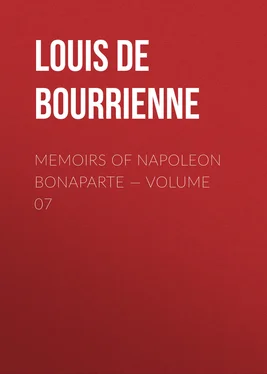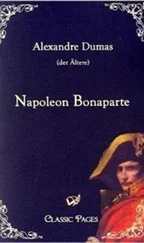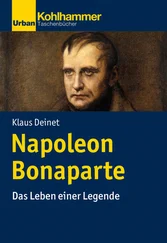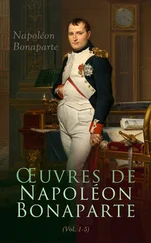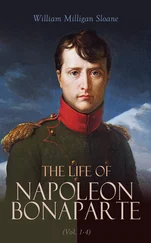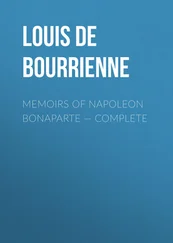Louis Bourrienne - Memoirs of Napoleon Bonaparte — Volume 07
Здесь есть возможность читать онлайн «Louis Bourrienne - Memoirs of Napoleon Bonaparte — Volume 07» — ознакомительный отрывок электронной книги совершенно бесплатно, а после прочтения отрывка купить полную версию. В некоторых случаях можно слушать аудио, скачать через торрент в формате fb2 и присутствует краткое содержание. Жанр: Биографии и Мемуары, История, foreign_edu, foreign_antique, foreign_prose, на английском языке. Описание произведения, (предисловие) а так же отзывы посетителей доступны на портале библиотеки ЛибКат.
- Название:Memoirs of Napoleon Bonaparte — Volume 07
- Автор:
- Жанр:
- Год:неизвестен
- ISBN:нет данных
- Рейтинг книги:4 / 5. Голосов: 1
-
Избранное:Добавить в избранное
- Отзывы:
-
Ваша оценка:
- 80
- 1
- 2
- 3
- 4
- 5
Memoirs of Napoleon Bonaparte — Volume 07: краткое содержание, описание и аннотация
Предлагаем к чтению аннотацию, описание, краткое содержание или предисловие (зависит от того, что написал сам автор книги «Memoirs of Napoleon Bonaparte — Volume 07»). Если вы не нашли необходимую информацию о книге — напишите в комментариях, мы постараемся отыскать её.
Memoirs of Napoleon Bonaparte — Volume 07 — читать онлайн ознакомительный отрывок
Ниже представлен текст книги, разбитый по страницам. Система сохранения места последней прочитанной страницы, позволяет с удобством читать онлайн бесплатно книгу «Memoirs of Napoleon Bonaparte — Volume 07», без необходимости каждый раз заново искать на чём Вы остановились. Поставьте закладку, и сможете в любой момент перейти на страницу, на которой закончили чтение.
Интервал:
Закладка:
Bonaparte came into the grand salon where I awaited him, and addressing me in the most good-humoured way said, "What do the gossips say of my preparations for the invasion of England?"—"There is a great difference of opinion on the subject, General," I replied. "Everyone speaks according to his own views. Suchet, for instance, who comes to see me very often, has no doubt that it will take place, and hopes to give you on the occasion fresh proofs of his gratitude and fidelity."—"But Suchet tells me that you do not believe it will be attempted."—"That is true, I certainly do not."—"Why?"—"Because you told me at Antwerp, five years ago, that you would not risk France on the cast of a die—that the adventure was too hazardous—and circumstances have not altered since that time."—"You are right. Those who look forward to the invasion of England are blockheads. They do not see the affair in its true light. I can, doubtless, land in England with 100,000 men. A great battle will be fought, which I shall gain; but I must reckon upon 30,000 men killed, wounded, and prisoners. If I march on London, a second battle must be fought. I will suppose myself again victorious; but what should I do in London with an army diminished three-fourths and without the hope of reinforcements? It would be madness. Until our navy acquires superiority it is useless to think of such a project. The great assemblage of troops in the north has another object. My Government must be the first in the world, or it must fall." Bonaparte then evidently wished it to be supposed that he entertained the design of invading England in order to divert the attention of Europe to that direction.
From Dunkirk the First Consul proceeded to Antwerp, where also he had assembled experienced men to ascertain their opinions respecting the surest way of attempting a landing, the project of which was merely a pretence. The employment of large ships of was, after rang discussions, abandoned in favour of a flotilla.
—[At this period a caricature (by Gillray) appeared in London. which was sent to Paris, and strictly sought after by the police. One of the copies was shown to the First Consul, who was highly indignant at it. The French fleet was represented by a number of nut-shells. An English sailor, seated on a rock, was quietly smoking his pipe, the whiffs of which were throwing the whole squadron into disorder.—Bourrienne. Gillray's caricatures should be at the reader's side during the perusal of this work, also English Caricature and Satire on Napoleon I., by J. Ashton Chatto: and Windus, 1884.]—
After visiting Belgium, and giving directions there, the First Consul returned from Brussels to Paris by way of Maestricht, Liege, and Soissons.
Before my visit to the Tuileries, and even before the rupture of the peace of Amiens, certain intriguing speculators, whose extravagant zeal was not less fatal to the cause of the Bourbons than was the blind subserviency of his unprincipled adherents to the First Consul, had taken part in some underhand manoeuvres which could have no favourable result. Amongst these great contrivers of petty machinations the well-known Fauche Borel, the bookseller of Neufchatel, had long been conspicuous. Fauche Borel, whose object was to create a stir, and who wished nothing better than to be noticed and paid, failed not to come to France as soon as the peace of Amiens afforded him the opportunity. I was at that time still with Bonaparte, who was aware of all these little plots, but who felt no personal anxiety on the subject, leaving to his police the care of watching their authors.
The object of Fauche Borel's mission was to bring about a reconciliation between Moreau and Pichegru. The latter general, who was banished on the 18th Fructidor 4th (September 1797), had not obtained the First Consul's permission to return to France. He lived in England, where he awaited a favourable opportunity for putting his old projects into execution. Moreau was in Pains, but no longer appeared at the levees or parties of the First Consul, and the enmity of both generals against Bonaparte, openly avowed on the part of Pichegru; and still disguised by Moreau, was a secret to nobody. But as everything was prosperous with Bonaparte he evinced contempt rather than fear of the two generals. His apprehensions were, indeed, tolerably allayed by the absence of the one and the character of the other. Moreau's name had greater weight with the army than that of Pichegru; and those who were plotting the overthrow of the Consular Government knew that that measure could not be attempted with any chance of success without the assistance of Moreau. The moment was inopportune; but, being initiated in some secrets of the British Cabinet, they knew that the peace was but a truce, and they determined to profit by that truce to effect a reconciliation which might afterwards secure a community of interests. Moreau and Pichegru had not been friends since Moreau sent to the Directory the papers seized in M. de Klinglin's carriage, which placed Pichegru's treason in so clear a light. Since that period Pichegru's name possessed no influence over the minds of the soldiers, amongst whom he had very few partisans, whilst the name of Moreau was dear to all who had conquered under his command.
Fauche Borel's design was to compromise Moreau without bringing him to any decisive step. Moreau's natural indolence, and perhaps it may be said his good sense, induced him to adopt the maxim that it was necessary to let men and things take their course; for temporizing policy is often as useful in politics as in war. Besides, Moreau was a sincere Republican; and if his habit of indecision had permitted him to adopt any resolution, it is quite certain that he would not then have assisted in the reestablishment of the Bourbons, as Pichegru wished.
What I have stated is an indispensable introduction to the knowledge of plots of more importance which preceded the great event that marked the close of the Consulship: I allude to the conspiracy of Georges, Cadoudal, Moreau, and Pichegru, and that indelible stain on the character of Napoleon,—the death of the Duc d'Enghien. Different opinions have been expressed concerning Georges' conspiracy. I shall not contradict any of them. I will relate what I learned and what I saw, in order to throw some light on that horrible affair. I am far from believing what I have read in many works, that it was planned by the police in order to pave the First Consul's way to the throne. I think that it was contrived by those who were really interested in it, and encouraged by Fouche in order to prepare his return to office.
To corroborate my opinion respecting Fouche's conduct and his manoeuvres I must remind the reader that about the close of 1803 some persons conceived the project of reconciling Moreau and Pichegru. Fouche, who was then out of the Ministry, caused Moreau to be visited by men of his own party, and who were induced, perhaps unconsciously, by Fouche's art, to influence and irritate the general's mind. It was at first intended that the Abbe David, the mutual friend of Moreau and Pichegru, should undertake to effect their reconciliation; but he, being arrested and confined in the Temple, was succeeded by a man named Lajolais, whom every circumstance proves to have been employed by Fouche. He proceeded to London, and, having prevailed on Pichegru and his friends to return to France, he set off to announce their arrival and arrange everything for their reception and destruction. Moreau's discontent was the sole foundation of this intrigue. I remember that one day, about the end of January 1804, I called on Fouche, who informed me that he had been at St. Cloud, where he had had a long conversation with the First Consul on the situation of affairs. Bonaparte told him that he was satisfied with the existing police, and hinted that it was only to make himself of consequence that he had given a false colouring to the picture. Fouche asked him what he would say if he told him that Georges and Pichegru had been for some time in Paris carrying on the conspiracy of which he had received information. The First Consul, apparently delighted at what he conceived to be Fouche's mistake, said, with an air of contempt, "You are well informed, truly! Regnier has just received a letter from London stating that Pichegru dined three days ago at Kingston with one of the King of England's ministers."
Читать дальшеИнтервал:
Закладка:
Похожие книги на «Memoirs of Napoleon Bonaparte — Volume 07»
Представляем Вашему вниманию похожие книги на «Memoirs of Napoleon Bonaparte — Volume 07» списком для выбора. Мы отобрали схожую по названию и смыслу литературу в надежде предоставить читателям больше вариантов отыскать новые, интересные, ещё непрочитанные произведения.
Обсуждение, отзывы о книге «Memoirs of Napoleon Bonaparte — Volume 07» и просто собственные мнения читателей. Оставьте ваши комментарии, напишите, что Вы думаете о произведении, его смысле или главных героях. Укажите что конкретно понравилось, а что нет, и почему Вы так считаете.
